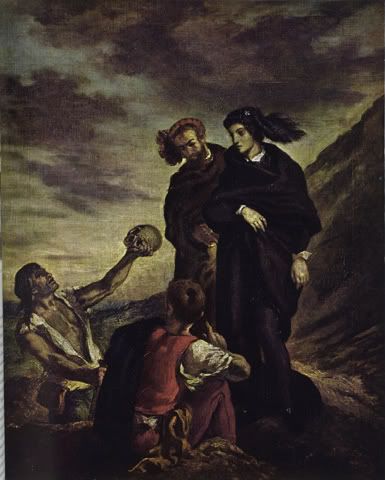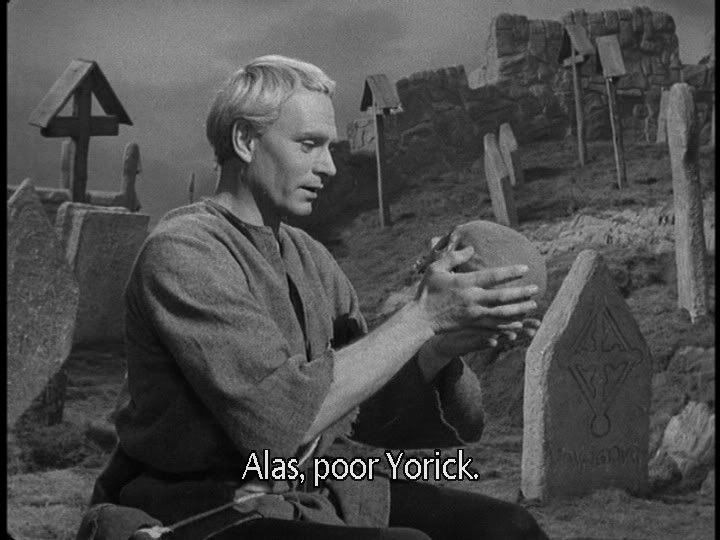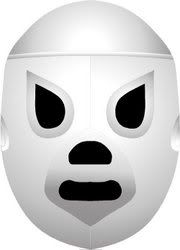Hamlet, Acto V, escena I

[Exit Second Clown.]
[Digs and sings.]
In youth when I did love, did love,
Methought it was very sweet;
To contract, O, the time for, ah, my behove,
O, methought there was nothing meet.
Hamlet:
Has this fellow no feeling of his business, that he sings at
grave-making?
Horatio:
Custom hath made it in him a property of easiness.
Hamlet:
’Tis e’en so: the hand of little employment hath the daintier
sense.
1 Clown.
[Sings.]
But age, with his stealing steps,
Hath claw’d me in his clutch,
And hath shipp’d me intil the land,
As if I had never been such.
[Throws up a skull.]
Hamlet:
That skull had a tongue in it, and could sing once: how the
knave jowls it to the ground,as if ’twere Cain’s jawbone, that
did the first murder! This might be the pate of a politician,
which this ass now o’erreaches; one that would circumvent God,
might it not?
Horatio:
It might, my lord.
Hamlet:
Or of a courtier, which could say ’Good morrow, sweet lord!
How dost thou, good lord?’ This might be my lord such-a-one, that
praised my lord such-a-one’s horse when he meant to beg
it,–might it not?
Horatio:
Ay, my lord.
Hamlet:
Why, e’en so: and now my Lady Worm’s; chapless, and knocked
about the mazard with a sexton’s spade: here’s fine revolution,
an we had the trick to see’t. Did these bones cost no more the
breeding but to play at loggets with ’em? mine ache to think
on’t.
1 Clown.
[Sings.]
A pickaxe and a spade, a spade,
For and a shrouding sheet;
O, a pit of clay for to be made
For such a guest is meet.
[Throws up another skull].
Hamlet:
There’s another: why may not that be the skull of a lawyer?
Where be his quiddits now, his quillets, his cases, his tenures,
and his tricks? why does he suffer this rude knave now to knock
him about the sconce with a dirty shovel, and will not tell him
of his action of battery? Hum! This fellow might be in’s time a
great buyer of land, with his statutes, his recognizances, his
fines, his double vouchers, his recoveries: is this the fine of
his fines, and the recovery of his recoveries, to have his fine
pate full of fine dirt? will his vouchers vouch him no more of
his purchases, and double ones too, than the length and breadth
of a pair of indentures? The very conveyances of his lands will
scarcely lie in this box; and must the inheritor himself have no
more, ha?
(…)

For and a shrouding sheet;
O, a pit of clay for to be made
For such a guest is meet.
[Throws up another skull].
Hamlet:
There’s another: why may not that be the skull of a lawyer?
Where be his quiddits now, his quillets, his cases, his tenures,
and his tricks? why does he suffer this rude knave now to knock
him about the sconce with a dirty shovel, and will not tell him
of his action of battery? Hum! This fellow might be in’s time a
great buyer of land, with his statutes, his recognizances, his
fines, his double vouchers, his recoveries: is this the fine of
his fines, and the recovery of his recoveries, to have his fine
pate full of fine dirt? will his vouchers vouch him no more of
his purchases, and double ones too, than the length and breadth
of a pair of indentures? The very conveyances of his lands will
scarcely lie in this box; and must the inheritor himself have no
more, ha?
(…)

Hamlet:
Whose was it?
1 Clown:
A whoreson, mad fellow’s it was: whose do you think it was?
Hamlet:
Nay, I know not.
1 Clown:
A pestilence on him for a mad rogue! ’a pour’d a flagon of Rhenish on my head once. This same skull, sir, was Yorick’s skull, the king’s jester.
Hamlet:
This?
1 Clown:
E’en that.
Hamlet:
Let me see. [Takes the skull.] Alas, poor Yorick!–I knew him, Horatio; a fellow of infinite jest, of most excellent fancy: he hath borne me on his back a thousand times; and now, how abhorred in my imagination it is! my gorge rises at it. Here hung those lips that I have kiss’d I know not how oft. Where be your gibes now? your gambols? your songs? your flashes of merriment, that were wont to set the table on a roar? Not one now, to mock your own grinning? quite chap-fallen? Now, get you to my lady’s chamber, and tell her, let her paint an inch thick, to this favour she must come; make her laugh at that.–Pr’ythee, Horatio, tell me one thing.
Whose was it?
1 Clown:
A whoreson, mad fellow’s it was: whose do you think it was?
Hamlet:
Nay, I know not.
1 Clown:
A pestilence on him for a mad rogue! ’a pour’d a flagon of Rhenish on my head once. This same skull, sir, was Yorick’s skull, the king’s jester.
Hamlet:
This?
1 Clown:
E’en that.
Hamlet:
Let me see. [Takes the skull.] Alas, poor Yorick!–I knew him, Horatio; a fellow of infinite jest, of most excellent fancy: he hath borne me on his back a thousand times; and now, how abhorred in my imagination it is! my gorge rises at it. Here hung those lips that I have kiss’d I know not how oft. Where be your gibes now? your gambols? your songs? your flashes of merriment, that were wont to set the table on a roar? Not one now, to mock your own grinning? quite chap-fallen? Now, get you to my lady’s chamber, and tell her, let her paint an inch thick, to this favour she must come; make her laugh at that.–Pr’ythee, Horatio, tell me one thing.

























No hay comentarios.:
Publicar un comentario